STORY HIGHLIGHTS
- An opposition group reports at least 137 killed Thursday
- Local observers report on sixth day of shelling in Zabadani
- Syrian state TV says armed gangs have begun new attacks in Homs
- The president has repeatedly denied attacking civilians
(CNN) -- A Syrian opposition group reported at least 137 deaths at the hands of government forces Thursday as President Bashar al-Assad escalated a brutal assault against an opposition that wants an end to his regime.
Thursday marked the fifth consecutive day of attacks on opposition activists and civilians in the besieged city of Homs -- Syria's third-largest city -- which has become a flashpoint in the uprising.
The Local Coordination Committees, a network of opposition activists that organizes and documents protests, said that 110 of the deaths were in Homs; 10 were children.
The president has repeatedly denied attacking civilians, saying Syrian forces are targeting armed gangs and foreign terrorists bent on destabilizing the government.
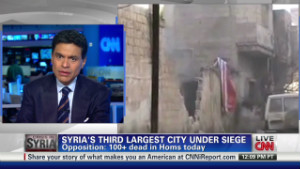
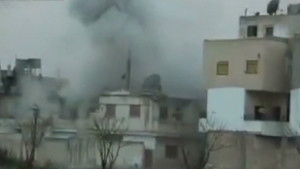
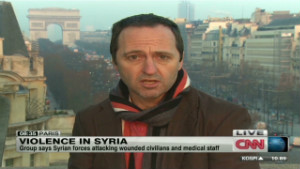
Syrian state television Thursday said armed terrorist gangs fired seven shells into Homs in the early morning, adding that there were no reports of damage.
The station then showed video of people it identified as residents saying armed gangs had fired on their homes and schools with shells and rocket-propelled grenades.
Nearly all other reports from within the country, however, tell a different story. Opposition activists in Homs describe explosions from mortars and tank shells launched by Syrian forces every few minutes, people bleeding to death in the streets for lack of medical attention, and snipers picking off civilians running for cover.
Video reportedly from Homs and posted online shows rubble and the remains of buildings as gunfire is heard in the background.
Medical charities say doctors inside Syria have reported hospitals, clinics, medical staff and patients being targeted.
A doctor in the Homs neighborhood of Baba Amr, Ali, said a group from the Red Crescent recently tried to visit to give medical aid, but their vehicle was attacked and they were forced to turn around.
CNN is not fully naming the doctor for his protection.
Satellite photos of Homs taken this month compared with photos taken in August 2010 show a changed city -- the recent photographs swaths of burned-out areas, blownoff roofs and empty streets. The 2010 photos of the same areas show streets packed with vehicles, and crisp lines of buildings, their roofs intact.
Civilians who enter hospitals with what would have been minor injuries if properly treated were left instead to die, said Col. Malek Al Kurdi of the rebel Free Syrian Army, who said he witnessed such a scene in the coastal city of Latakia.
"Al-Assad is now using the tactic of attacking three or more cities at the same time to attempt to deter the revolt," Al Kurdi said. "Last night the killers attacked Zabadani, Homs, and Talkala at the same time."
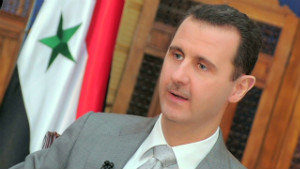
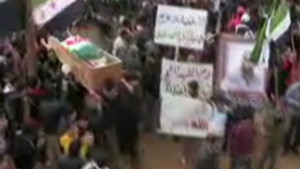
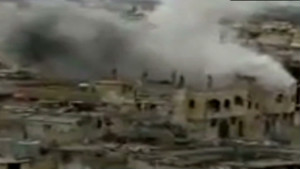
The LCC described the shelling of Zabadani, going on for a sixth consecutive day. Ten people died on Thursday, five of them members of the same family, the group said. Another 40 people were wounded, it said, adding that medical supplies, fuel and food were in short supply.
Attacks also occurred in the cities of Lattakia, Daraa, Idlib, and the Damascus suburbs, and said snipers were on rooftops in the southern village of Taseel, the group said.
The LCC accused the government of lying about its own attacks.
In Taseel, it said, "a civilian's home was exploded and a huge amount of weaponry was brought in, then photographed by the Syrian regime's state media as tools and acts of armed gangsters to justify for raiding the town, which is now strictly sealed off."
CNN cannot independently confirm reports in Syria because the government has severely limited the access of international journalists.
Britain's ambassador to Syria painted a picture of a brutal crackdown on civilians in a Foreign Office blog post Thursday. Simon Collis described seeing peaceful protesters, including the elderly and children, being beaten. Those chanting for freedom in the Umayad Mosque in Damascus were also beaten, he said.
"It is too shocking to ignore," Collis wrote, calling for world condemnation of the actions of al-Assad's regime.
In an open letter, a group calling itself the Syrian Scientific Community asked the Syrian Army not to participate in the killing of people and the shelling of cities and neighborhoods, no matter the reason. They also want aid and ambulances to be allowed to reach their destinations freely without obstruction.
A U.N. Security Council resolution addressing the violence failed to pass over the weekend after Russia and China vetoed it. The 13 other Security Council members, including the United States, voted for the resolution, which was also supported by the European Union and the Arab League.
With the Security Council at an impasse, the United States and other countries have called for the creation of a "Friends of Democratic Syria" group to support a free and democratic Syria, said Victoria Nuland, the U.S. State Department spokeswoman.
Turkish Foreign Minister Ahmet Davutoglu arrived Thursday in Washington, where he was expected to hold talks with U.S. lawmakers on an Arab League proposal on Syria. The plan calls for resuming a monitoring mission to determine whether al-Assad is abiding by an agreement that his government would end all violence.
Turkey has been critical of al-Assad's crackdown.
Also critical of Syria is Libya, which experienced its own revolt last year that led to the downfall of longtime leader Moammar Ghadafi. Libya announced Thursday it is expelling the Syrian charge d'affaires and his staff because of the "escalation" of the government's crackdown on its people.

No comments:
Post a Comment
yes